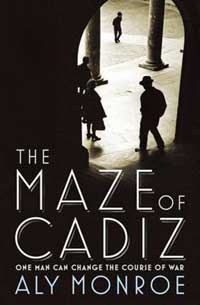 Publishers John Murray have a penchant for thrillers and adventures set around the world, often written by expatriates. One example from last year was The Creator’s Map—Emilio Calderón’s tale of espionage in wartime Rome—and more recently they’ve published The Maze of Cadiz, the debut novel from Aly Monroe.
Publishers John Murray have a penchant for thrillers and adventures set around the world, often written by expatriates. One example from last year was The Creator’s Map—Emilio Calderón’s tale of espionage in wartime Rome—and more recently they’ve published The Maze of Cadiz, the debut novel from Aly Monroe.
The Maze of Cadiz introduces British “economic warfare” agent Peter Cotton, who’s set to appear in a series of novels from the author. This first story sees Cotton sent to Cadiz in the closing days of the Second World War. His mission is initially to locate and relieve R A May, a British agent assigned to watch imports and exports in the port, and who seems to have gone rogue, withdrawing large sums of money and not replying to communications. Before Cotton can reach him and discover the reasons for his strange behaviour, May turns up dead. Cotton’s left to tidy up the mess, his only official contact in the region an obstructive vice-consul.
Cotton spends much of the book visiting expatriates and getting a sense of the community in which the mysterious R A May has spent his last days. There’s a chance here for Aly Monroe to draw on her own experiences of expat life in Spain, so we can expect the characters Cotton meets to be at least inspired by these experiences, if not actually drawn directly from life. The encounters are often amusing and well written, and provide the heart of the book. However, very little story takes place in these scenes, which are more focussed on observing personalities, and when Cotton does take action at the climax of the book, it’s almost unclear how he got there. The result, then, is a relatively low-key novel of incidental pleasures, intended as a gentle introduction to Monroe’s new character.
One frustrating quirk of Monroe’s style is the way she uses foreign languages in dialogue. We can assume that most of the book’s dialogue takes place in Spanish, but Monroe keeps reminding us by giving lines first in Spanish, then in English. Here, for example, is a scene in which all of the direct speech presumably takes place in Spanish:
‘What is that?’ asked Cotton.
‘It’s the old customs house,’ said the porter. ‘Now the provincial government. That stone is from the Cadiz that lies under the sea. They chipped the shells off.’
‘What do you mean?’
‘The maremoto.’
Cotton thought for a moment. Maremoto. Seaquake. ‘When was that?’ he asked.
‘Oh…’ said the porter, ‘hace mucho.‘ A long time ago.
Cotton nodded. ‘They told me that Cadiz wasn’t fought over in your war,’ he said.
‘Well, it depends what you mean by “fight”,’ said the porter. ‘En Cádiz hubo algo de bronca pero también muchas estupideces.’ There was some violence, but also many stupidities.
or again:
‘¿Adónde?’ said the taxi driver. Where to?
‘Al cementerio británico, por favor,’ said Cotton.
‘Hm. No favor about it,’ said the taxi driver huffily.
Cotton had forgotten that in Spain, please – por favor – can be taken as sarcastic.
Taken as isolated quotations, these snippets actually don’t seem so bad, almost diverting, but the constant use of the technique throughout the book is quickly tiring and repetitive. This switching between languages sometimes creates a strange impression of the characters themselves alternating between two languages: Spanish-in-English and Spanish-in-Spanish. This effect, when no such alternation has actually taken place, is a little distracting. It’s also not clear why some of these lines are in Spanish, as for the most part they aren’t particularly unusual phrases.
It might have been better just to present all of the Spanish dialogue in English, as the overall effect of Monroe’s approach to dialogue seems to be a variety of the same disease that The Creator’s Map suffered from: expat pedantry. In this case, rather than stuffing the prose with little lectures on Roman history, Monroe seems to have an urge to give us a starter course in colloquial Spanish (the second example above is a particularly good example of this, sounding not unlike an illustrative anecdote from a language book). It’s irritating, but not on the same scale as Calderón’s novel: this is just an unfortunate and distracting stylistic quirk, while the fact-stuffing of the other book actually damaged the realism of the characters themselves.
Low-key and flawed as The Maze of Cadiz may be, Monroe’s eye for character and the general atmosphere of the book make it an entertaining read, and it suggests that there’s potential in Aly Monroe and Peter Cotton. This new series may well turn out to be a cornerstone of John Murray’s range of international thrillers.
(Peter Cotton’s next adventure will apparently take him to the USA, which should sidestep the issue of using foreign language in dialogue. Afortunadamente. Fortunately.)













January 3rd, 2009 at 6:44 pm
This is so funny! I completely understand how the double language bit makes the book harder to read, nevertheless I am intrigued by the plot and by Cotton. Thanks for sharing.
January 3rd, 2009 at 7:41 pm
I know this is off topic, but have you read any of Javier Marias. I stumbled on him off a TLS review of his Your Face Tomorrow series (although All Souls is a better starting point) and find him very interesting. When he does move into Spanish, which is not that often, you do have to figure it out yourself.
January 5th, 2009 at 11:15 am
Hi Kevin,
No, I’m not familiar with Javier Marias. What does he write?
January 5th, 2009 at 5:14 pm
Marias is Spanish and writes in Spanish — but the novels that I have read are all set in England. He spent a year at Oxford and that produced All Souls (his most accessible book that I have read). Oxford being gossipy Oxford and that “novel” containing so many characters who appeared to be real people, All Souls produced an industry speculating on its characters — which lead to Dark Back of Time (which Marias calls “a false novel”) that is either a memoir or novel exploring what happened when he returned to England and ran into all the speculation arising from All Souls.
Marias’ major work is a trilogy, Your Face Tomorrow, which has its roots in the characters he introduces in All Souls. The trilogy is centred on an MI5 like intelligence agency (or is it a private security firm — we never really know) but its strength is in the characters that Marias explores. The first two volumes have been translated and released. The third (it was a review of this one in the TLS that first drew me to Marias) was supposed to be released in English last fall — according to Stewart, it is now set for July this year.
I do think you would find All Souls an interesting introduction to Marias. If you like it, the other books are worthwhile — if you don’t, I’d give them a miss. Given what I know of your personal background, I do think you would find Marias’ exploration and observations about Oxford’s relationship to the “real” world worth the read.
January 5th, 2009 at 6:10 pm
You’re right, All Souls does sound interesting. It’s on the list!
January 5th, 2009 at 6:35 pm
Marias’ description of Oxford dinner parties is enough in itself to make All Souls worthwhile (my entire Oxford experience is limited to three weeks but even I could relate to the picture he paints).
January 6th, 2009 at 11:06 am
It’s been a while since I was at an Oxford dinner party, but I can imagine all too well. I’ll definitely be checking this one out, Kevin. Or at least buying it and putting in the pile with all the others I want to read but don’t have time for…
January 10th, 2009 at 6:07 am
Rob: Thought I would let you know that I’ve decided trying to force other people to review Canadian work — or cluttering up their blogs with long thoughts of my own on books they haven’t reviewed — is just not fair. So I’ve joined the book blogging world as KevinfromCanada at http://www.kevinfromcanada.wordpress.com. I’ve taken the liberty of adding The Fiction Desk to my blogroll — hope you don’t mind. Do drop by and please feel welcome to comment.
January 10th, 2009 at 1:39 pm
That’s great news, Kevin! I’ll definitely be reading your blog… although I hope this doesn’t mean you’ll stop commenting elsewhere!
September 14th, 2009 at 1:38 pm
Interesting. I’ve just come across this and written a blog post talking of the use of foreign language in books – and Javier Marias.
http://alymonroe.blogspot.com/
September 15th, 2009 at 2:12 pm
Hi Aly, thank you for your comments on the review, here and on your own blog.
I agree that language is an important part of character. The point in my review was that presenting dialogue in both languages (“‘¿Adónde?’ said the taxi driver. Where to?”), and the occasional didactic notes, as at the bottom of the second quote, were a little distracting. It’s also tricky to present one line of dialogue in one language and the next in another when no change of language has “really” taken place: it suggests a change to the dynamic of the conversation that isn’t there.
While I suggest in the review that one alternative would be to present all of the Spanish in English, I wouldn’t for a moment suggest that this is the only—or even the best—way to do it.
September 20th, 2009 at 1:01 pm
Hi Rob,
Many thanks for your comments.
Apart from sharing the flavour of the characters’ actual voices with the reader, I also want to give over a kind of ‘pop’ before Cotton realises what is being said, in other words to have the reader share the same insecurity as Cotton. At times, a stumbling, even humble dynamic but – I hope you will agree – realistic and part of the maze.
Turn the languages round. How would a Spaniard get on with a book set, say, in 1944 Newcastle? Tricky? Yes. But worth the effort, I’d say.
I have put up another blog post on related matters.
http://alymonroe.blogspot.com/
Thanks again
Aly
January 6th, 2010 at 6:34 am
I enjoyed the book tremendously because Aly Monroe imparts the wonderful Andalucian ambiente and flavor. What would it be without her phrases in Spanish? For anyone who does know the language and has heard them speak..!! I for one could “hear” the characters speak. Pa’lante, Aly Monroe !! Sabor !!